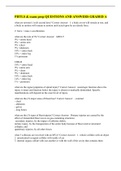Exam (elaborations)
PHTLS & exam prep QUESTIONS AND ANSWERS GRADED A
- Course
- Institution
what are newton's 1st & second laws? Correct Answer: 1: a body at rest will remain at rest, and a body in motion will remain in motion until acted upon by an outside force 2: force = mass x accelleration what are the rule of 9's? Correct Answer: ADULT 9% = entire head 9% = entire arm 9% ...
[Show more]



